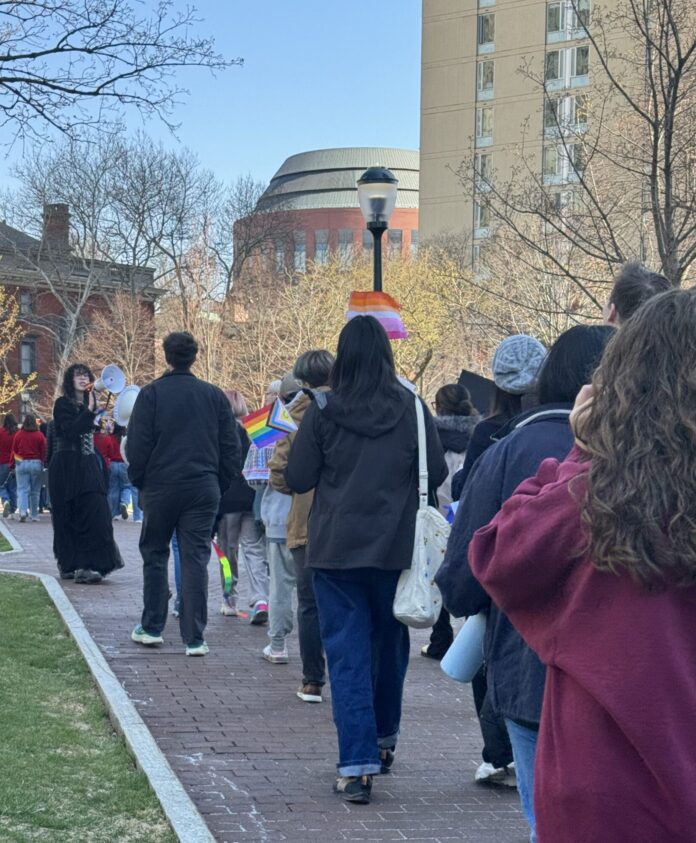
“Feelings of isolation are common here at Penn but are particularly poignant within the queer community,” said Lily Brenner to a crowd outside of the University of Pennsylvania’s Penn LGBT Center on March 22. By noon, more than 40 students, faculty members, and other supporters had gathered to participate in the March for Queer Liberation — a protest and rally co-organized by Brenner in collaboration with Penn’s affinity groups Out in STEM (OSTEM) and Penn Non-Cis — to call attention to problems LGBTQ+ students are facing at Penn.
Penn’s marching band showed up decked out in rainbow gear to play a few pop songs and lead the group on their trek across campus. The xylophonist and drummer played rhythmic tunes as familiar call-and-response chants echoed throughout the courtyards on the walk over to Blanche Levy Park. Some onlookers cheered, waved and blew kisses — but one student yelled teasing remarks about pronouns.
“I have a lot of friends who are close to me who are LGBT, so this is just one way to support them,” said one band member, who said it has been hard for some of his friends — especially those who share his Asian heritage and culture — to come out to their families.
He also noted that the hatred and lack of acceptance from broader society is palpable even as an ally.
“Keeping all that into account, I just wanted to support them today,” he said.
At the park, protestors stood in front of a statue of Benjamin Franklin, which they donned with a rainbow umbrella. Speakers addressed the crowd — which grew to over 60 people as passersby joined to listen.
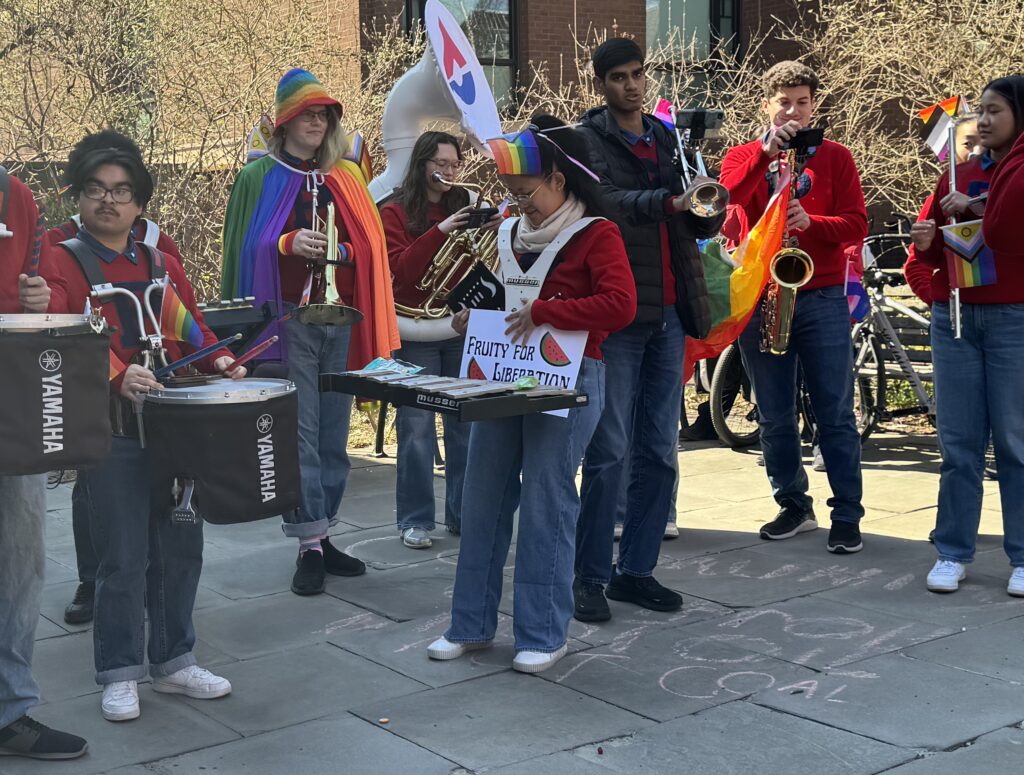
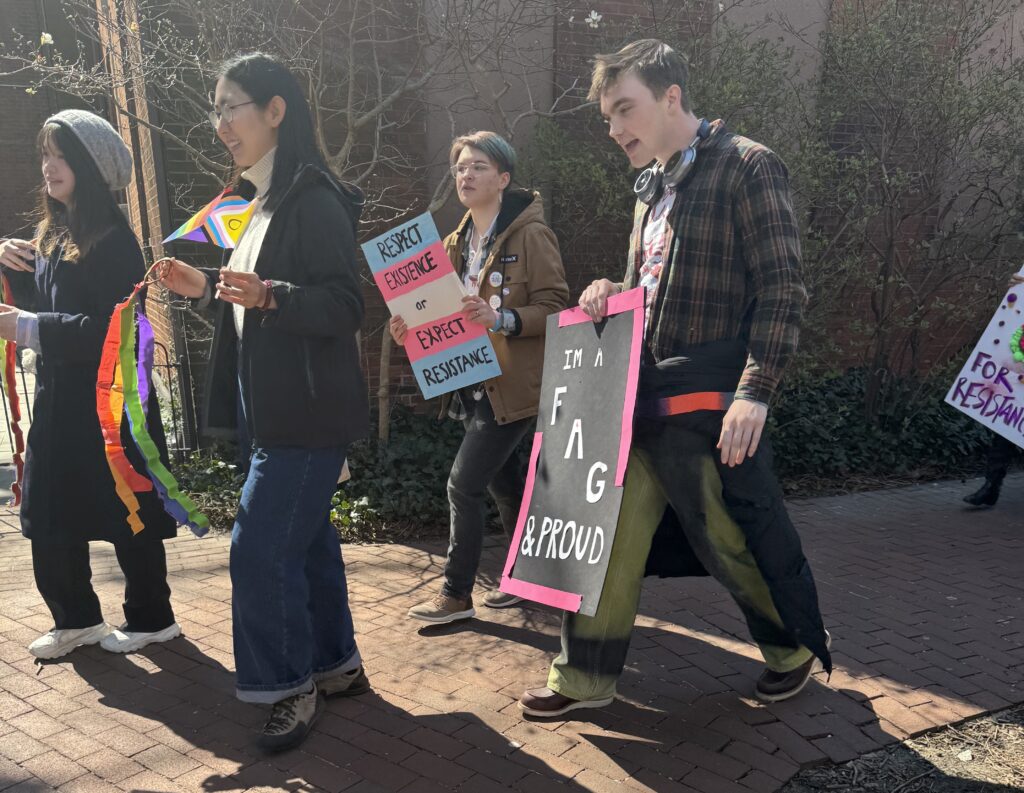
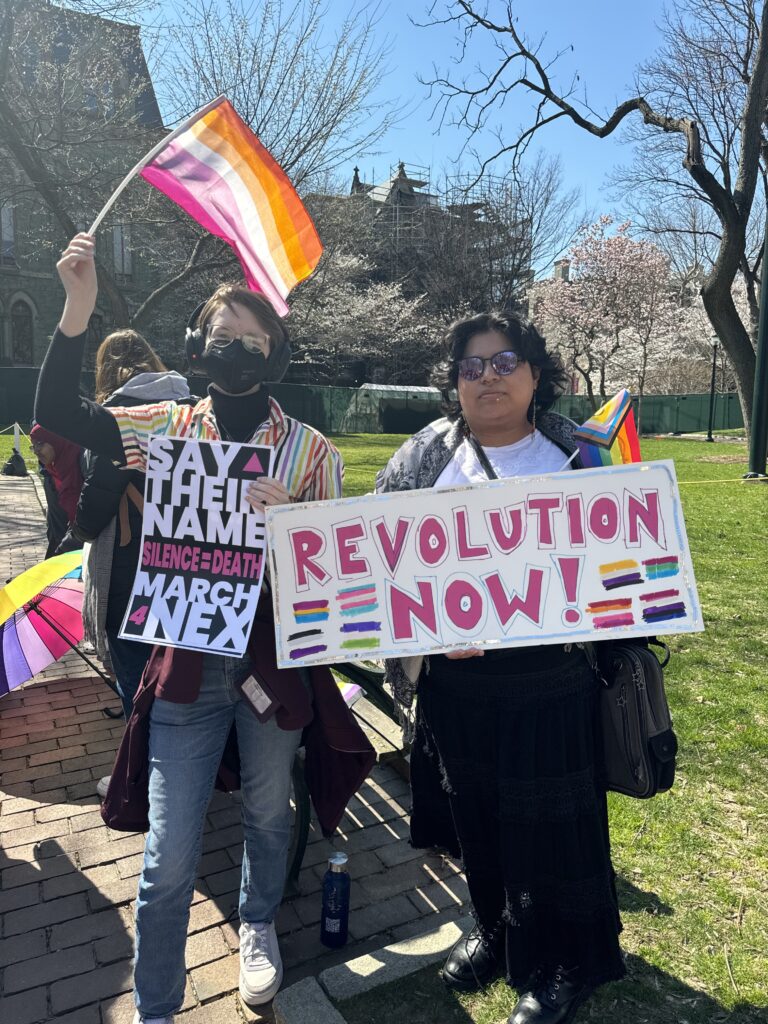
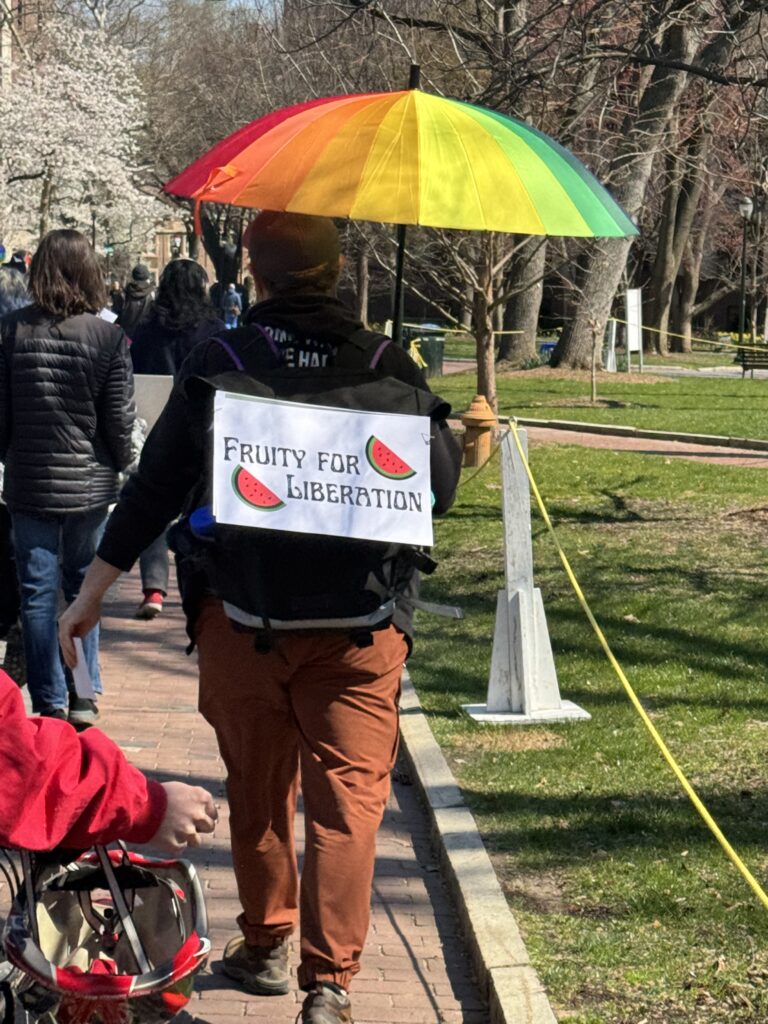
“So why are we here in particular? What can Penn do for us both as the queer community of this institution and a part of the global queer community?” asked Brenner, introducing the group’s list of demands — which includes funding for queer scholars to conduct research and teach more courses, funding for cultural groups, stronger collaboration with queer institutions across the city, better health and wellness support for queer students, and fairer enforcement of the university’s guidelines on freedom of expression.
A request for funding
“What can more funding do for us?” she asked, noting that the Gender, Sexuality, and Women’s Studies program has not had an increase in budget since its inception in 1983.
“Penn has the power to set the social and political norm for the queer community 10 years in the future, and the investments we make right now into intersectional, queer scholarship and research will change our future,” she emphasized — noting the importance of developing programs that specifically train queer people to become experts in queer medicine, advocacy, mental health, law, and other jobs at the intersection of queer identity. “This is an urgent investment that we are demanding right now.”
The group’s request for funding extends to ask Penn to share its financial resources with existing queer organizations in Philadelphia. Brenner noted that Penn’s nonprofit tax exemptions could be allocated to support queer-led institutions — such as the William Way LGBT Community Center, the Attic Youth Center, and the Bread and Roses Community Fund.
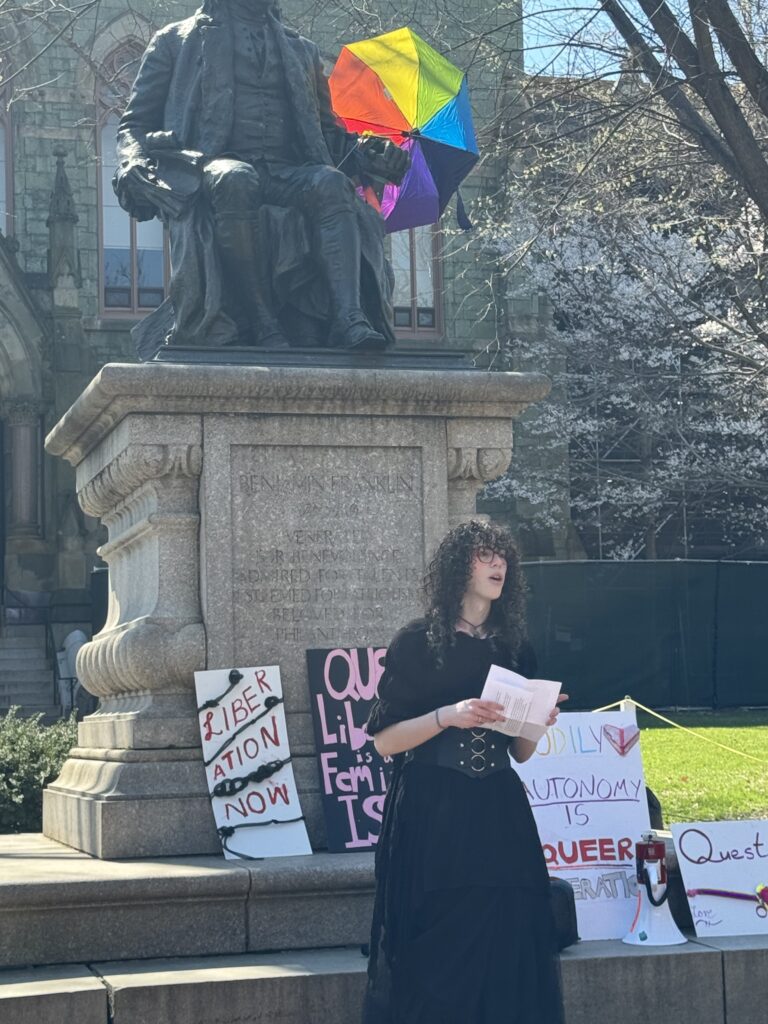
Issues that impact daily life
Brenner underlined the need to expand wellness resources — demanding an increase in the distribution of a wider variety of sexual and reproductive healthcare products, such as internal condoms, lube packets, gloves, dental dams and pregnancy tests.
“I and others have had too many incredibly frustrating experiences of wandering around buildings looking for gender neutral bathrooms, finding out that many buildings on campus don’t have them at all,” she added, underlining that she and other students have waited unreasonably long — seven years — for an equitable solution to emerge. She suggested including LGBTQ+ representatives on committees that tackle these issues. Another speaker later offered an expedited, first-step fix that would convert many multi-stall bathrooms into single-use spaces with the addition of a lock.
“I personally am sick and tired of experiencing microaggressions every time I see office hours or ask a question in class,” she added, underlining that it is difficult for students to escape their deadnames (which appear in their email addresses, at the security desks, and on packages) because of an antiquated approach to name changes in administrative systems.
A desire for more freedom of speech
“The open expression guidelines are what enable us to be here today; however, the administration has repeatedly violated the rights of student activists and placed them in disciplinary processes,” Brenner said, noting that the administration put restrictions on the March for Queer Liberation too.
“I’m sorry — but they do not get to tell us what queer liberation looks like,” she said. “It’s entirely possible that OSTEM or I personally will be put into a disciplinary process once this is over. The pattern of violating student rights to open expression cannot stand.”
Hadar, who works at the UPenn LGBT Center, noted disappointment that the center did not openly condemn attacks on Palestine — but noted that they do not believe the group is solely to blame for that silence.
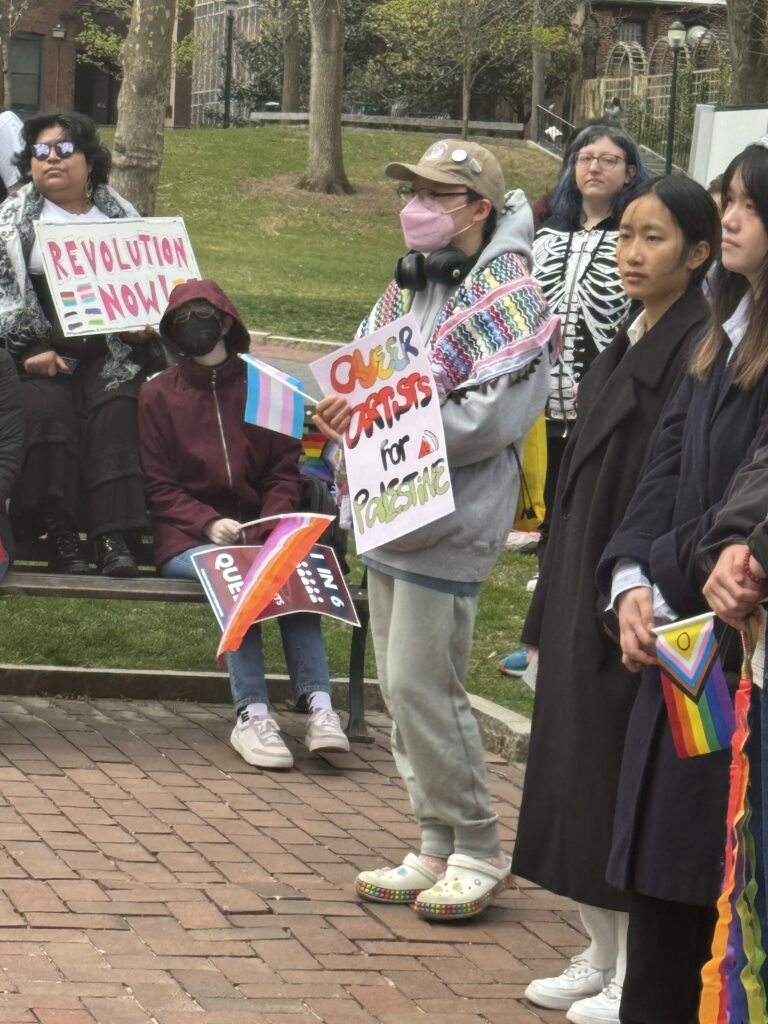
“There are systems in place here at Penn to restrict, censor, and control places like the LGBT Center,” they said. “Even in today’s March for Queer Liberation, this is too radical for the university — and in order to control us, they’ve not only policed it from the background but they were telling us that they would police it here too with Penn cops.”
“Many people who work at these resource centers remain silenced out of fear of losing their jobs,” they underlined.
A need for intersectional support
During her speech, Brenner noted a lack of investment in queer and cultural spaces which impacts student life. Additional speakers highlighted their own experiences of being otherized on campus or lacking the resources to do what they needed to cultivate community or progress their causes.
“Existing as ourselves is already an act of rebellion in a society that considers us abnormal, and we should take pride in going against that,” said one member of the campus’s asexuality affinity group.
“It is 2024, and QBlack is the first Black, queer organization that has been allowed to thrive on Penn’s campus,” said Ngozi Agosh, a member of the organization, who spoke about the lack of recognition and space for Black, queer people on campus and in broader community.
“The movement for queer and trans liberation has always held abolition at its core,” said Sparrow, another speaker, who underlined that the movement has always challenged authority. They highlighted that activists must take steps to make the community safer for its Black and most marginalized members.
“These very systems play out on our campus as well. [The administration] decided that our demand for rights is an inconvenience that must be managed by punitive systems such as the disciplinary office and police,” they said, encouraging students to get involved in efforts to abolish police and prisons.
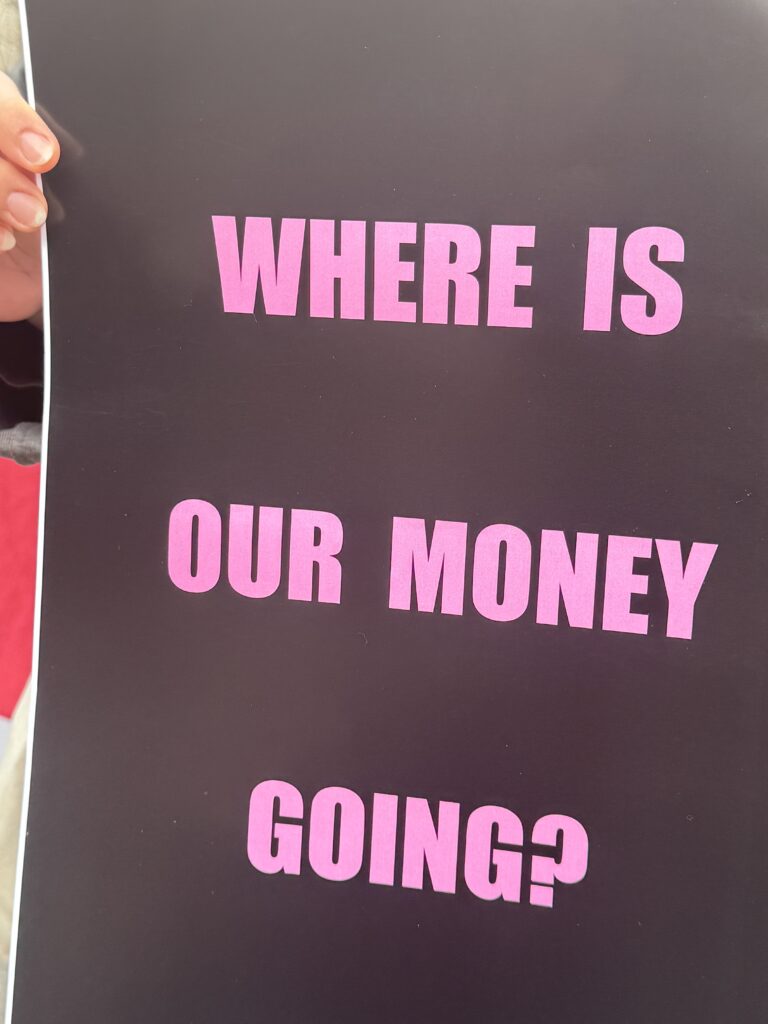
A call to address the university’s colonialist history
“Queer liberation, for me, began with an internal revolution — the emancipation of predefined roles and expectations,” a Muslim protester said to the crowd, highlighting that queer love and queer expression were often prohibited under the law of British colonizers where it had been legal before.
“Standing here right now, I have noticed the turmoil within me questioning what people will think when they see a queer hijabi speak — but I am reminded that this is a dangerous reality for queer Palestinians who are denied their existence because of colonial age law,” they said, underlining that their faith leads them to challenge structures that deny people justice and dignity.
“None of us are free until all of us are free,” emphasized a student, Eug Xu. Participants chanted, “No Pride in genocide,” before another speaker took the bullhorn.
“How will a group of Western queers at one of the West’s imperial universities fundamentally transform this university’s project of occupying, displacing, and deterritorializing Black and Indigenous life and land?” they said. “How will we change the trajectory of this university that tends to wash its history of both slow and spectacular genocide?”
Support from LGBTQ+ leaders and allies on campus
“As we see an increasing level of hate and discrimination from different policies that are looking to be passed for our community, now’s the time to make sure we speak up, stand out and push forward for equal rights for all but especially queer folks as well,” Malik Muhammad, former associate director of the UPenn LGBT center, told PGN.
Muhammad came out to support students and to show that queer people on campus deserve to thrive. He expressed concern about the increasing push to stifle and eliminate diversity education in higher education, explaining, “I think that is something that stems from a place of folks trying to maintain a level of power when that power is being questioned.”
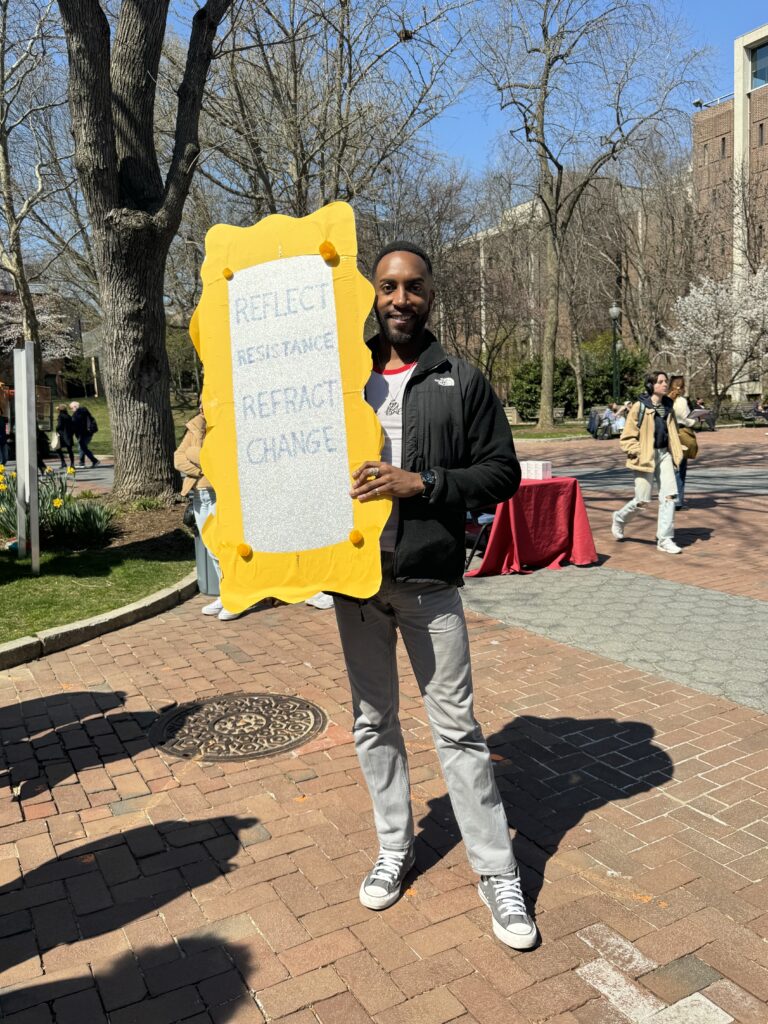
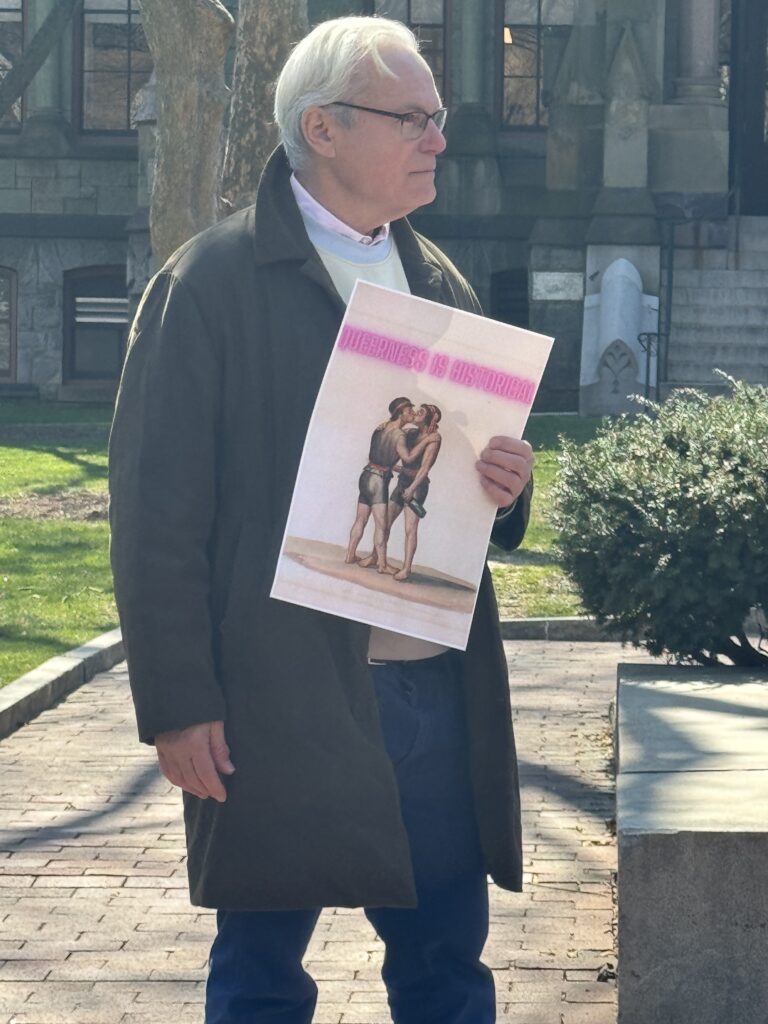
Jonathan Katz — a Penn professor who is a pioneer in the field of queer art history and a founder of queer activist organizations — underlined in a speech to the crowd that LGBTQ+ people are currently making stronger advancement than ever before.
“I’m just really excited to see a rebirth in activism during a time when we really need it,” he told PGN after the demonstration.
“We are winning,” he said to the crowd. “What we need to remember in our darkest hour is that we are actually changing the culture. And I can tell you — I’m 65 years old. I am living proof, right? Because this would have been an absolute impossibility when I was your age. This culture is going to be built in our image — and as children grow up into this world, they are going to be on our side.”
“Time is our friend,” he underlined. “Things are actually — and this isn’t just can — they are getting better.”